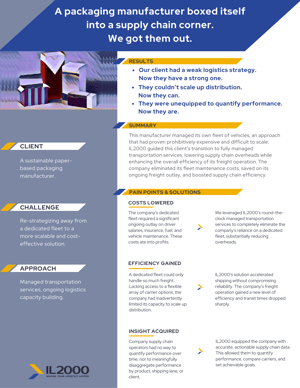SUMMARY
Before approaching IL2000, this sustainable paper-based packaging manufacturer managed its own fleet of vehicles. While this approach supported reliability in a narrow sphere of operations, the approach had proven prohibitively expensive and difficult to scale. The company needed a way to lower supply chain overheads while enhancing the overall efficiency of its freight operation. IL2000 developed and implemented a transition to fully managed transportation services. The company eliminated its fleet maintenance costs, saved on its ongoing freight outlay, and boosted its supply chain efficiency.
COMPANY PROFILE
One of the products this Midwest-based packaging manufacturer caters to is pharmaceutical products. They produce cartons and combination packaging for medications as well as specialized patient adherence packaging — notably, tamper-proof blister packs for safely storing tablet and capsule medications. Pharmaceutical packaging is a challenging arena, impacted by strict shipping regulations, tight delivery windows, and high expectations for reliability. These variables, combined, made supply chain agility particularly challenging for the company.
PAIN POINTS
- The company ran its own fleet of vehicles for short-haul shipping, mainly to give the company’s freight team greater control over shipments. However, that control came at a significant cost. A constant outlay on driver salaries, insurance, fuel, and vehicle maintenance was eating into profits.
- A self-managed fleet also introduced a less financially obvious efficiency constraint to the company’s supply chain operations. A finite fleet of short-haul vehicles could only handle so much freight. Lacking access to a flexible array of carrier options, the company had inadvertently limited its capacity to scale up distribution.
- The company’s supply chain team knew its freight operation was operating well below optimum efficiency. However, company supply chain operators had no way to quantify performance over time, nor to meaningfully disaggregate performance by product, shipping lane, or client. Long story short, the company lacked a systematic approach to collecting data. It lacked the tools to harness that data, and the expertise to then generate critical supply chain insight.
CHALLENGE
The company needed to rapidly transition away from managing its own fleet in favor of a more scalable and cost-efficient solution. But they needed to execute that transition in a way that maintained smooth and reliable distribution to a demanding client base. In essence, the company was dealing with a classic change management dilemma: Our client needed to shore up critical strategy leaks without rocking the operational boat.
SOLUTION
It’s probably a little out of place in a case study to describe passion as a solution. However, it was IL2000’s passion for working with packaging manufacturers to solve their most challenging supply chain problems that attracted this client’s attention. Two decades of intellectual investment in the space has equipped our team with a sophisticated toolkit for inventing smart solutions to the unique pressures packaging companies face. The company knew they needed a purpose-built supply chain solution and that our team could deliver.
Costs lowered
It’s one thing to recognize that a company should retire its dedicated fleet of vehicles. It’s another to define what to do next, when to make it happen, and how to do it effectively. Our first adventure with this client was to perform a detailed analysis of its fleet operations, crunching numbers and weighing shipping options to identify a feasible transition plan. We found a way to leverage IL2000’s round-the-clock managed transportation services to completely eliminate the company’s reliance on a dedicated fleet within a reasonable timeframe.
Today, we’re successfully managing all their freight — even the short-haul runs for which the company had hitherto relied solely on a dedicated fleet. All ongoing vehicle management costs disappeared from the company’s ledger, substantially reducing overheads. Our client realized further savings as our team priced out multiple carriers to find the most cost-effective option within the time available.
Efficiency gained
Moving to managed transportation services wasn’t just a cost-saving move for the company. As our client’s new freight operation matured, IL2000 was able to find faster shipping approaches without compromising reliability. Transit times dropped sharply. For the first time, the company could objectively quantify the efficiency of its on-time performance and make data-driven decisions to guide continuous improvement.
With IL2000, the company gained access to a dedicated TL team with experience and connections geared specifically to pharmaceutical and food packaging manufacturers. The company’s freight operation gained a level of efficiency it was unable to achieve running its own fleet, and could confidently guarantee on-time delivery even for freight that needed to move on a same-day turnaround.
Insight acquired
In this case, our client chose not to internally manage its supply chain business intelligence, opting instead to rely on IL2000 expertise. A team of IL2000 supply chain experts analyzed the company’s supply chain performance, offering daily recommendations for smooth delivery outcomes as well as quarterly performance reviews to better position the company’s supply chain for continued growth.
Crucially, IL2000 equipped the company with objective data on its supply chain performance. Instead of guessing at how their supply chain is doing, the company was able to accurately quantify performance against a baseline, compare the cost efficiency of different approaches, and set achievable goals.
RESULTS
- Our client had a weak logistics strategy. Now they have a strong one.
- They couldn’t scale up distribution. Now they can.
- They were unequipped to quantify performance. Now they are.
Download the one page Case Study here


